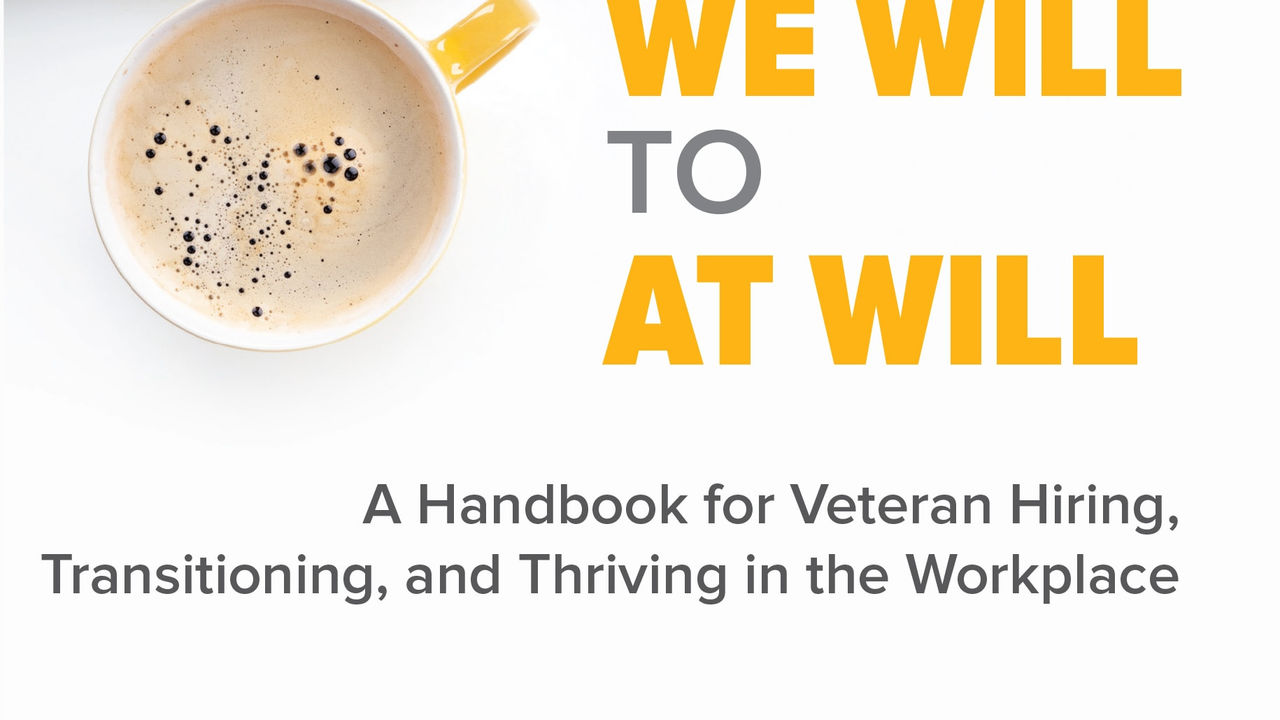Justin Constantine was a law student when he made the decision to join the U.S. Marine Corps. He was stationed around the world as an attorney—from Okinawa, Japan, to California, and, in 2006, he was deployed to Iraq. While there, he was developing contracts with local officials to rebuild destroyed infrastructure and build civil relationships when he was shot in the head and sent home.
Now, Constantine is a nationally known speaker on the topic of veterans' affairs and hiring transitioning military personnel. His new book, From We Will to At Will: A Handbook for Veteran Hiring, Transitioning, and Thriving in the Workplace (SHRM, 2018), with Andrew Morton, is an essential guide for both HR professionals and military veterans on how to facilitate veteran hiring in the civilian workplace.
From debunking myths about post-traumatic stress disorder to training HR professionals to understand the military skill set, Constantine's book addresses, discusses and provides comprehensive solutions to the hot-button issue of veteran hiring.
He recently spoke to HR Magazine:
Were there any specific experiences that inspired you to write a book about veterans' affairs in HR?
It wasn't really a specific experience, more of a collection of experiences. I was very fortunate—because I had suffered such a grievous injury, I guess a lot of people heard about what happened to me, and a lot of people offered me jobs after I recovered. I ended up consulting in the veteran employment arena. So, I become very aware that veteran employment was quite a challenge for many reasons. But, after a few years I had gathered a lot of information, had written a lot of blogs and articles, and had given presentations related to different aspects of veteran employment, and I thought, "There aren't a lot of great resources out there." There certainly wasn't one book that encapsulated best practices and observations for HR professionals and veterans at the same time. So, I thought, "There's a market, I've learned a lot along the way, and I feel that my experience may help HR professionals, veterans and military spouses."
If you could cite one thing, what would you consider the most important change HR professionals can make in their practice to best serve veterans?
I don't want to give just one tip, because I don't think that will do this important topic justice, but I will say "to adopt a broader mindset." Most HR folks don't come from the military because it's a very small sliver of our population. At the same time, a lot of companies have identified veterans as a great source for employees who are often overlooked. But that can be very intimidating for HR professionals because they don't have a military background. They don't understand the way we talk, they don't know our experiences and the value we bring, and so I think they can shy away from hiring veterans or just not pay much attention to their resumes because they don't understand what's on there.
In your experience, what are the biggest obstacles to veterans finding jobs in the typical office workplace?
Just as I hope the HR professionals will be open to hiring veterans, this is a two-way street, and I think the veterans are just as responsible for learning how to talk to civilian HR professionals in a language that they understand, and to write their resumes in a way that's consistent with what those companies are used to seeing. Veterans need to make sure they understand—and can articulate—why a company should hire them.
And, many veterans are not used to networking—talking about themselves, bragging about themselves, talking to other people about what they've accomplished. But that's what's required in the private sector.
In your book, you talk about the specific skills that veterans have that they can bring to the workplace. Could you talk more about those?
One easy one is leadership. And when I say leadership, it doesn't mean a colonel commanding a thousand troops on a battlefield. It could mean that, but it typically means small-unit leadership, a corporal or sergeant leading 12 to 15 people, which is a critical part of any company. Where else are leadership skills better developed than in the military?
We also are physically fit and mentally fit—that's important to being productive—and time management is important to us, too. We want to get a job done, and we want to get it done on time. We don't want to just look at problems, we want to attack them and overcome them. All of those are skills that apply to any sector of industry.
One more skill I would add is teamwork. In the military, there's no other option but teamwork. We're used to working with a wide variety of diverse people who may not look like us or talk like us or come from the same background, but we work together to accomplish a mission.
This book is approved for SHRM recertification credit. After reading the book, earn a passing score on an online quiz and receive 3 professional development credits (PDCs). Register for the quiz.
Katie Wattendorf is an editorial intern at SHRM.
An organization run by AI is not a futuristic concept. Such technology is already a part of many workplaces and will continue to shape the labor market and HR. Here's how employers and employees can successfully manage generative AI and other AI-powered systems.




